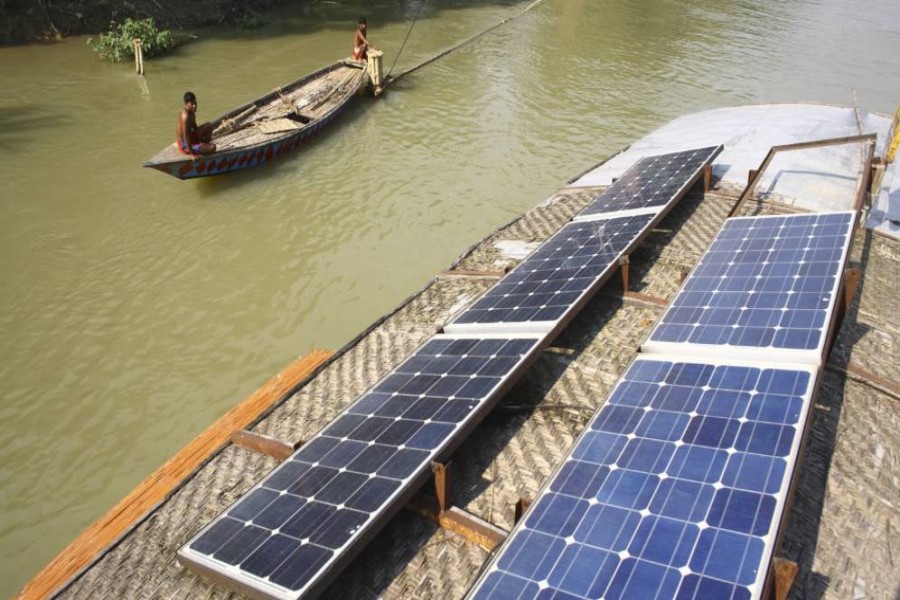
Published :
Updated :

In Bangladesh, the renewable energy scenario has been a bit stagnant as the proportionate growth on renewable energy could not be seen in the last couple of years. It contributes 3.10 per cent to the national energy power mix, according to the Sustainable and Renewable Energy Development Agency of Bangladesh (SREDA).
For a country that has graduated from the LDC category, the figure is too low. The main sources of Bangladesh's renewable energy till date are solar and hydro-electricity. Although Bangladesh is a pioneer in installing Solar Home Systems (SHSs), most of these installations were made by some non-government organisations (NGOs).
The government has set a target to generate 2,000 megawatts of electricity from renewable energy sources in three years, which will be 10 per cent of the country's total power production. Currently, nearly 600 megawatt (MW) of electricity is coming from renewable sources, according to the relevant ministry. Authorities have taken some measures for increasing renewable energy production in line with the Seventh Five-Year Plan and the initiatives for achieving the target-3 of the Sustainable Development Goals (SDGs).
Bangladesh has, meanwhile, topped a global list of renewable energy using countries, by installing the highest number of SHSs. Over 5.0 million solar systems have so far been installed under a programme of the Infrastructure Development Company Limited (IDCL).
The company is promoting and financing renewable energy initiatives and energy efficient projects through public-private-partnership. Nearly 15 million beneficiaries are getting solar power from such SHSs. The SREDA is promoting and developing renewable energy and energy efficiency activities in public and private sectors. The government has signed a good number of agreements with private entrepreneurs for setting up green energy plant. It has recently taken an initiative to generate 500 MW of electricity from solar plants, which will require $2.76 billion funding.
Out of the required fund, $2.23 billion is expected to come from development partners while the remaining will be arranged by the government and private partners. Under a long-term plan, the government approved four solar power plants having a combined capacity of 258 MW to be installed at different places in the next 20 years at a cost Tk 91.58 billion.
There is no denying that sustainable and renewable energy is the future. The government is expected to introduce a new policy to increase use of renewable energy as part of its greater goal to ensure energy security. Currently, the country's power generation is mostly dependent on imported oil and natural gas which is running out fast.
The country has to depend on other sources of renewable energy - wind, biomass and biogas - amid growing concerns over a steady decline of non-renewable resources.
The country is dependent on non-renewable resources such as petroleum and natural gas to meet energy needs. Efficient utilisation of renewable energy resources is yet to assume commercial dimensions and hence rational policy measures on renewable energy usage are essential.
Steps have been taken to encourage generation of energy through biomass, and biogas due to availability of rice-husk, crop residue, woods, jute stick and animal waste. The main renewable energy resources in Bangladesh are biomass, solar, wind and hydropower.
The country has good prospects of utilising solar photovoltaic (PV) systems for electricity generation, but high capital requirement is a barrier. Biomass is the major energy source and biomass utilisation systems represent a proven environment-friendly option for small- to medium-scale decentralised electricity generation.
Natural gas, liquefied petroleum gas (LPG), electricity, kerosene and biomass fuels are used for cooking. In areas without natural gas and electricity, biomass is used to meet household cooking needs.
Agricultural crops generate large quantities of residues. Such residues represent an important source of energy both for domestic and industrial purposes. Other sources of biomass are farm-animal wastes and poultry droppings.
Accordingly, there is a huge possibility to produce electricity using biogas, if proper research is carried out. The country has adequate number of poultry farms and cattle farms. By establishing biogas plants in these farms, electricity could be generated.
All said and done, the country has to exploit renewable energy resources, as much as possible, to generate electricity. With fast depleting natural gas reserve, such options must be diligently weighed to meet the increasing energy demand.


 For all latest news, follow The Financial Express Google News channel.
For all latest news, follow The Financial Express Google News channel.